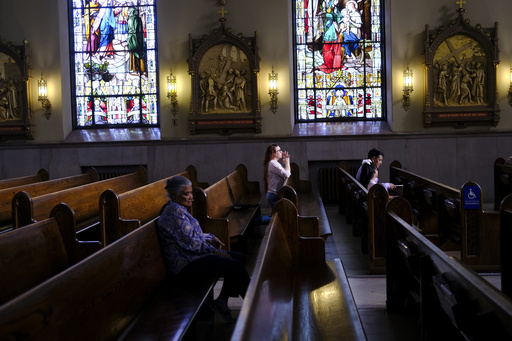
PITTSBURGH — Catholic voters have become a significant swing group in recent presidential elections across the nation. In Pennsylvania, a key battleground state, they are expected to represent at least 25% of the electorate, which makes their influence crucial in determining the outcome of the upcoming election.
The political landscape in Pennsylvania has seen changing tides. In 2016, Donald Trump garnered approximately 44,000 more votes than Hillary Clinton, whereas Joe Biden managed to defeat Trump by 80,000 votes during the 2020 election cycle. John Fea, a history professor at Messiah University in Pennsylvania, noted that Biden’s identity as an Irish-American Catholic and regular churchgoer resonated with many Catholic voters. He remarked that while Biden might not have been the perfect candidate in their eyes, he was relatable due to their shared background.
Now, with Trump leading the Republican ticket again, he is joined by JD Vance, who is Catholic, while the Democratic ticket features Kamala Harris, who is of Black and South Asian descent and comes from a Baptist tradition, alongside Tim Walz, a white Lutheran. Fea speculated that some voters from Biden’s birthplace, Scranton, who felt aligned with Biden due to the Catholic connection, may not feel the same about Harris, altering their voting intentions.
Nikki Bruni, an anti-abortion advocate from Pittsburgh, expressed her strong opposition to Harris due to her stance on abortion, declaring her support for Trump despite her discontent with his departure from the party’s longstanding principles on the issue. Bruni, who heads an anti-abortion group called People Concerned for the Unborn Child, insists that the importance of the election compels her to vote in order to prevent what she views as a moral decline.
On the flip side, some Catholics backing the Harris campaign feel similarly pressed to advocate for their beliefs. A group named Catholics Vote Common Good has recently launched billboards in Pittsburgh and Erie to encourage Catholics to think beyond the single issue of abortion, advocating for a focus on broader social justice concerns evident in Catholic teaching.
Kevin Hayes, the Pennsylvania chair for the group, highlighted that being pro-life encompasses matters like immigration, health care, and support for families, not just the anti-abortion stance. He expressed concern over Trump’s attacks on democratic institutions, framing them as a threat to the country’s democratic values.
While both parties are seeking to win over Hispanic Catholic voters, the majority of Pennsylvania’s Catholic community is rooted in European immigrant families who originally contributed to the state’s industrial workforces. This demographic has dwindled over time, but many remain, with their cultural imprint evident in the architecture around the state. Hayes stressed the importance of recognizing this group and urged the Harris campaign to engage with them more actively.
It’s critical to note that there is no longer a consolidated “Catholic vote” as observed in previous decades. Nevertheless, significant numbers of Catholic voters still exist. According to AP VoteCast data from the 2020 election, 27% of voters in Pennsylvania identified as Catholic, and neighboring swing states like Michigan and Wisconsin also hold substantial Catholic populations. Polling showed a competitive landscape among Catholic voters in Pennsylvania.
In that same election year, Pennsylvania Catholics, primarily of white and non-Hispanic descent, favored Trump over Biden with a margin of 55% to 44%, contrasting with the national Catholic vote that showed more parity, largely influenced by a higher number of Hispanic voters.
Vance’s candidacy reflects the influence of conservative Catholic perspectives. Despite his Catholic ties, he has aligned with Trump’s minimized focus on abortion as a defining issue, even while Trump cites his appointments to the Supreme Court as instrumental in shifting the legal landscape surrounding the topic.
In response to perceived neglect, Hayes and other Harris supporters have mobilized their own efforts to engage Pennsylvania Catholics. Recently, a group of Catholic supporters embarked on a bus trip to Wilkes-Barre near Scranton, where they made stops for Mass and conducted door-to-door outreach before concluding with a campaign rally.
The organizer, Steve Rukavina, explained that their mission particularly targeted individuals of Polish, Ukrainian, and other Eastern European descent, many of whom have ties to NATO nations. Rukavina underscored discontent with Trump’s remarks questioning NATO’s role and his vague commitments about ending the conflict in Ukraine, asserting that these aspects might sway Polish and Ukrainian American voters toward the Democratic ticket in 2024.
U.S. Catholic bishops have highlighted abortion as a top issue, asserting it poses a direct threat to the most vulnerable individuals in society. They also referenced various concerns that do not align perfectly with either political party, such as LGBTQ+ rights, religious liberties, migrant welfare, and access to healthcare and education.
Recent surveys indicate that fewer than half of Catholics regarded abortion as a key factor when considering their votes. Other pressing matters included gun control, foreign policy, Supreme Court appointments, and healthcare, with immigration, crime, and economic conditions being even more significant.
Following a recent Mass at St. Paul Cathedral in Pittsburgh, Trump supporter James Karamicky voiced frustrations regarding the current administration’s border control policies and its extensive financial support for Ukraine while neglecting issues like homelessness at home.
Similarly, Tatiana Rad, a Ukrainian Catholic immigrant and Trump supporter, expressed her belief that Republicans are more favorable towards religious freedoms and commented on the need for strong U.S. leadership to ensure global peace.
In contrast, Brandon Friez, a student at the University of Pittsburgh supporting Harris, emphasized that her leadership would help safeguard democracy, pointing out ethical concerns related to the Trump administration’s treatment of impoverished individuals.
